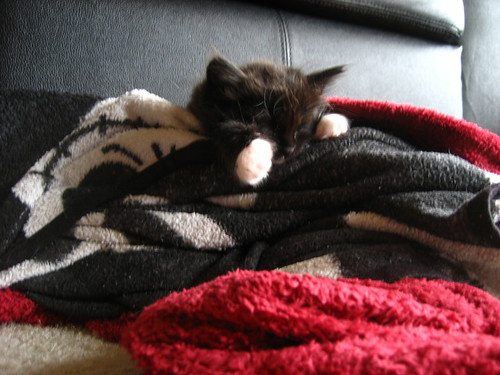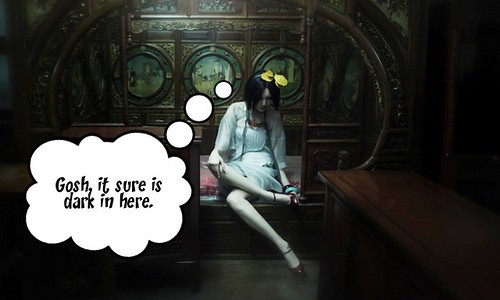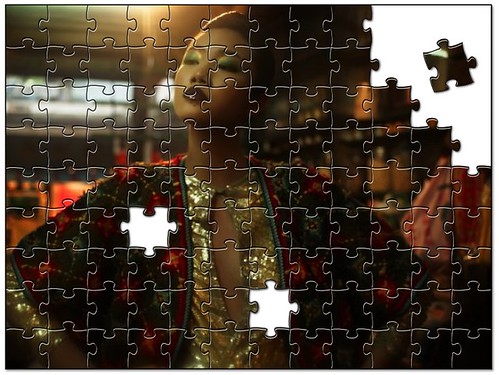Ah, Google Reader and I are old friends. I currently have a large number of RSS feeds I read on a daily basis. The majority are book related - my favorite book review sites, library related comic strips, the blogs of favorite authors and by other librarians. I also follow a few techy blogs- here are the sites of my favorites:
1. Engadget for keeping track of the latest technology news
2. Life Hacker not only a tech site, but offers solutions and shortcuts for a variety of life situations. Sometimes this is a bit of a DIY site.
3. Switched similar to engadget, provides tech and internet related news
4. Neil Gaiman's Journal because even though I haven't read his work, I find him interesting (and cute)
5. The Graveyard Shift A blog that provides real life accounts of what it's like to work for law enforcement, in order to help writers write accurately. A lot of really interesting stuff is on this blog that I didn't know about the police!
For a while I was checking my blogs through bookmarks, but when I started becoming interested in working in libraries as a career, I switched to Google Reader. Now I'm surprised I ever went without it!
5.26.2009
5.19.2009
Things 3, 4 & 5
So, I have created a flickr account and have uploaded some pictures of my patio with my summer plants, and my new kitten.
I found the organizing method different than other photo sites I've used before (photobucket), and the exploding icon was amusing when removing items. I also used the import contacts feature and found a few friends on flickr and looked at their photos. I liked that it supported email hosts other than yahoo, as my primary email account is through gmail.
I did a search for purple + wallpaper to try and find some awesome wallpapers for my home desktop. I liked the results I got from flickr more than the same search I did on google using image color search. The quality of the photo was much nicer. However, unless the image had been made available in all sizes, I was not able get a high-resolution copy of that image, which was frustrating. I understand flickr might not be meant for that purpose though.
Here is a picture of my kitty, Napoleon, that I uploaded on flickr.

He's being sleepy.
I tried to go to the spell with flickr page but kept getting a response error and the page would not load. Instead, I tried flickrfling using the engadget rss feed to pull up flickr images. It was a bit slow, and not really a great way to get news, but it was interesting!
Then I went to colr pickr and pulled up a bunch of images in purple (of course!). I liked that mashup a lot, but I think I'm a very color oriented person, so that makes sense to me.
Finally, I went to FD toys and edited a photo with a caption. It reminded me trying to put together a few manga pages in photoshop in highschool. I know this isn't really meant to be a professional comic-making tool but I think it could be used for that without too much trouble. I just wish you could resize the shapes.

Image chef was a little too cheesy for my tastes. And then I tried Comic Strip Creator.
![created[1].at.www.FotoTrix.com](http://farm3.static.flickr.com/2461/3547076932_09e82febae.jpg)
Cool effect, ugly watermark, and I don't mean the ripples!

Now that's a really cool effect. Spiffy!
I found the organizing method different than other photo sites I've used before (photobucket), and the exploding icon was amusing when removing items. I also used the import contacts feature and found a few friends on flickr and looked at their photos. I liked that it supported email hosts other than yahoo, as my primary email account is through gmail.
I did a search for purple + wallpaper to try and find some awesome wallpapers for my home desktop. I liked the results I got from flickr more than the same search I did on google using image color search. The quality of the photo was much nicer. However, unless the image had been made available in all sizes, I was not able get a high-resolution copy of that image, which was frustrating. I understand flickr might not be meant for that purpose though.
Here is a picture of my kitty, Napoleon, that I uploaded on flickr.

He's being sleepy.
I tried to go to the spell with flickr page but kept getting a response error and the page would not load. Instead, I tried flickrfling using the engadget rss feed to pull up flickr images. It was a bit slow, and not really a great way to get news, but it was interesting!
Then I went to colr pickr and pulled up a bunch of images in purple (of course!). I liked that mashup a lot, but I think I'm a very color oriented person, so that makes sense to me.
Finally, I went to FD toys and edited a photo with a caption. It reminded me trying to put together a few manga pages in photoshop in highschool. I know this isn't really meant to be a professional comic-making tool but I think it could be used for that without too much trouble. I just wish you could resize the shapes.

Image chef was a little too cheesy for my tastes. And then I tried Comic Strip Creator.
![created[1].at.www.FotoTrix.com](http://farm3.static.flickr.com/2461/3547076932_09e82febae.jpg)
Cool effect, ugly watermark, and I don't mean the ripples!

Now that's a really cool effect. Spiffy!
Thing 2
Well, I've read the two web articles about Web 2.0. Some of the software/old product titles discussed I had never heard of, and I consider myself a tech-savvy person. I do remember when Google first started gmail and I received an invite from a friend for the beta (it was invite only at the time). Before that I used a no-name email server and wasn't interested in Yahoo or hotmail. Now I also use Google reader, gtalk/gchat, and Google documents, and am pleased with these products. I guess I'm a bit of a Google fan.
Despite the fact that I spend most of my awake time near a computer, and was born into 'Generation Tech', I'm not real big into the social networking sites. I have a facebook page, but only ever use the site when a friend/classmate sends a message. I just don't find it convenient to update so frequently, which is a reason I have not yet tried twitter. I'm the sort of person who has a few good friends and beyond that, I like to keep my social life simple. Accumulating followers is not something I yearn for.
I appreciated what the O'Reilly article was saying about how the future is the web essentially running and providing services by accumulating data/effort from the masses. I am someone who frequently uses sites like Wikipedia, or the custom maps on Google Maps for special events (like wildfires, or the swine flu) and I love how you don't have to be an expert or someone with authority to contribute to something important.
I've heard on a number of library listserves about concerns that young people and library users are not able to discern between good data sources and bad, and that this is one area that makes reference librarians truly useful. I think in Web 2.0, young people might get the chance to hone these skills more than they might have in the past, when they realize that all data is created by their peers and that it is up to them to decide whether it's true or not.
It would be interesting to compare Web 2.0 theories to the theories of democracy in society. Isn't something run by the masses, for the masses, one of the most democratic things ever? I want to see Government 2.0 next.
Despite the fact that I spend most of my awake time near a computer, and was born into 'Generation Tech', I'm not real big into the social networking sites. I have a facebook page, but only ever use the site when a friend/classmate sends a message. I just don't find it convenient to update so frequently, which is a reason I have not yet tried twitter. I'm the sort of person who has a few good friends and beyond that, I like to keep my social life simple. Accumulating followers is not something I yearn for.
I appreciated what the O'Reilly article was saying about how the future is the web essentially running and providing services by accumulating data/effort from the masses. I am someone who frequently uses sites like Wikipedia, or the custom maps on Google Maps for special events (like wildfires, or the swine flu) and I love how you don't have to be an expert or someone with authority to contribute to something important.
I've heard on a number of library listserves about concerns that young people and library users are not able to discern between good data sources and bad, and that this is one area that makes reference librarians truly useful. I think in Web 2.0, young people might get the chance to hone these skills more than they might have in the past, when they realize that all data is created by their peers and that it is up to them to decide whether it's true or not.
It would be interesting to compare Web 2.0 theories to the theories of democracy in society. Isn't something run by the masses, for the masses, one of the most democratic things ever? I want to see Government 2.0 next.
5.08.2009
5.07.2009
ようこそ! Thing 1
Subscribe to:
Comments (Atom)


